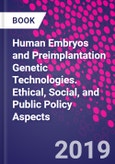Human Embryos and Preimplantation Genetic Technologies: Ethical, Social, and Public Policy Aspects presents the first holistic analysis of PGD and PGS as it is practiced and regulated worldwide. In addition to scientific and technical aspects, the book provides perspectives on the ethical, legal, religious, policy and social implications of global assisted reproduction technologies, including in Africa, Asia, Europe, North and South America, and Australia. Chapters cover history, ethics, feminism, family dynamics, psychological and interpersonal factors, the current state of PGD and PGS in 20 different sovereign nations and religious communities, and provide an analysis of public policy concerns and future directions.
Please Note: This is an On Demand product, delivery may take up to 11 working days after payment has been received.
Table of Contents
1. The challenge for medical ethicists: Weighing pros and cons of advanced reproductive technologies to screen human embryos during IVFInmaculada de Melo-Martin
2. Too much information? The paradox of enlarging genetic datasets for human embryo assessment during in vitro fertilization (IVF)
Shachar Zuckerman and Gheona Altarescu
3. A new global perspective: Geographic variations in the use of preimplantation genetic technologies to screen human embryos
Alexander M. Quaas
4. Elective gender selection of human embryos during IVF: Ethical and public policy considerations
Gab Kovacs
5. Embryo mosaicism and its impact on IVF decisionmaking when using preimplantation genetic screening: Current challenges and controversies
Gon Shoham, Yuval Yaron and Ariel Weissman
6. Genetic counseling for preimplantation genetic testing (PGT): Practical and ethical challenges
Emily L. Mounts and Andria G. Besser
7. Psychological and interpersonal factors in preimplantation embryo assessment
Timothy Bracewell-Milnes, Jara Ben-Nagi and Meen-Yau Thum
8. Nonideal theory, self-respect, and preimplantation genetic technologies
Clair Morrissey and Elena Neale
9. Fate of non-transferred screened embryos from IVF: Current challenges and future directions
Alice J. Shapiro, Catherine Shea and Vitaly A. Kushnir
10. The Islamic perspective: Application of advanced reproductive technologies to screen human embryos during IVF
Gamal I. Serour and Ahmad G.I. Serour
11. An Orthodox Jewish approach to ethical and social aspects of embryo testing
Gideon Weitzman, Lior Segev and Benjamin David
12. The Australia experience: Cultural and political factors shaping human embryo assessment during in vitro fertilization
Brette Blakely, Tereza Hendl and Sheryl de Lacey
13. The Belgian experience: Cultural and political factors shaping preimplantation genetic diagnosis during in vitro fertilization
Guido Pennings and Heidi Mertes
14. The Brazil experience: Evolution and future trajectories of public health policy regarding human embryo assessment
Fernanda Souza Peruzzato and Juliana Cuzzi
15. The Chilean experience: Cultural and political factors shaping human embryo assessment during IVF
Fernando Zegers-Hochschild and Juan Enrique Schwarze
16. The Croatian experience: Cultural and political factors shaping human embryo assessment during assisted reproductive technology
Tamara Tramisak Milakovic and Ivana Milas Klaric
17. The Ireland experience: Cultural and political factors shaping the development of regulation of assisted human reproduction, ethical status of human embryos, and proposed regulation of surrogacy
Evelyn Mahon
18. The Thailand experience: Cultural and political factors shaping human embryo assessment during IVF
Patsama Vichinsartvichai
19. The Ukraine experience: Preimplantation testing of human embryos
Lyuda V. Shkrobot
20. Mitochondrial replacement therapy: Ethical, sociocultural, and public policy considerations
Shelley Dolitsky and Mark V. Sauer
21. Editing human reproduction? Legal and ethical aspects of genome editing
Judit Sandor








